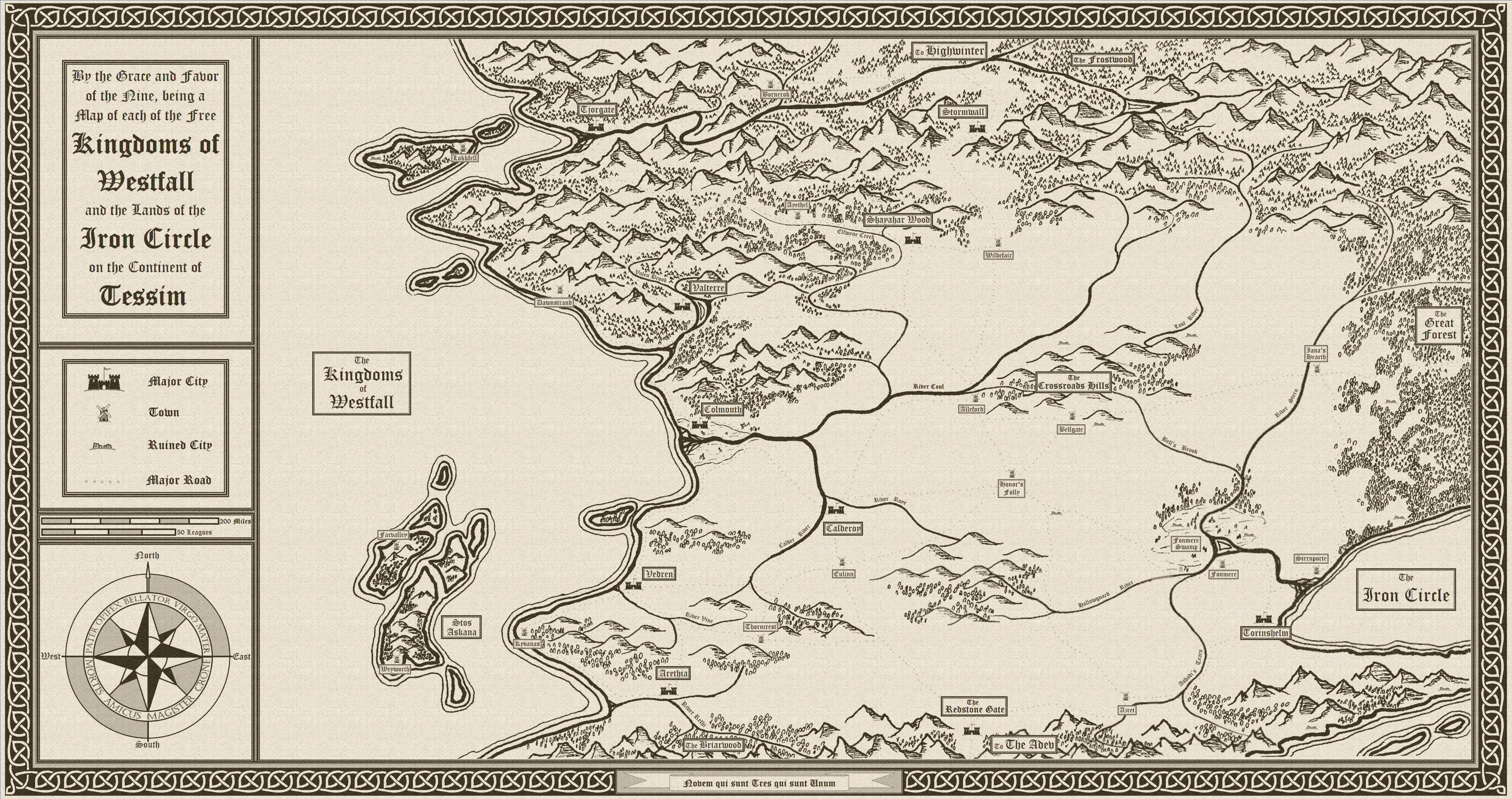Posts: 3,745
Thanks: 15378 in 92 Posts
33 Achievements
View My Journal
Quote: Originally posted by omglo
I have multiple questions. Feel free to answer what you want. What's the class structure like and how easy it to climb the social ladder?
What is childhood generally like?
Why do the people there fear magic instead of embracing it?
How did the Gray Prince end up in power and what do his people think of him?
What's the typical diet like?
|
For several of your questions it'll depend a lot on what part of the world you're talking about, though at this point I haven't had reason to consider food much beyond knowing that the River Coul in the center of the map is largely surrounded by fertile river valleys, so agriculture is more successful there!
Childhood in most parts of the world would be fairly short, followed by apprenticeships for the common and working-class populations, and private tutelage for the wealthy. The major exceptions to this for human populations would be in Valterre, where the population sizes are limited in any one area by mountains, and each canton taking an "it takes a village" approach to raising children, so there are typically going to be schools of some sort in each community, and in Torinshelm, where a much more militaristic attitude took hold during the War of the Iron Circle some 50 years ago, and formal schooling is the norm at least for children born in and near cities, though it is largely focused on military preparedness. For non-human populations it may be different- elves in places like the Briarwood or Ayethel tend to have family groups that view education as an ongoing thing for decades, Dwarves along the western reaches of the Tjorn River to the north have much more regimented apprenticeships or religious or political tutelage systems that look more like guilds than schools to most outsiders, and Halflings in Stos Askana probably have what would be the most "normal" childhood, with small communities that frequently have something like a one-room schoolhouse.
This also kind of gets at the class structures and social mobility in many of these places... most of the time you'd be limited by geography and economics, even without an enforced social hierarchy. The Iron Circle is much more restrictive, though the military is often seen as a way to climb higher in society than would otherwise be possible. Elves and Halflings in this part of the world tend to be in small enough groups that there isn't much need for social stratification, while Dwarves tend more towards loyalty to clan and guild membership than viewing society as stratified- though Dwarves who are unhappy with their situation may take the initiative to settle new colonies where they can remake themselves in a way.
Magic isn't feared in much of this world, though assuming you're referring to the references in the Westfall Witch's Cottage story, that cottage would be on the edge of the forests somewhere in the Shayahar Wood, and isolated areas like that, especially close to Elven populations, tend to be more wary of anything that seems 'different' since they don't have much direct connection to the wider world. The other area where magic is viewed with concern would be the Iron Circle, where children showing magical abilities are typically taken by the military to be raised in training programs, so seeing someone with magic usually also means seeing someone who's important enough militarily to cause you trouble!
Finally, the Gray Prince isn't a formal political leader- he's a bastard son of the late King of Torinshelm who led a surprise raid through the Crossroads Hills and down the River Coul to sack Calderoy early in the War of the Iron Circle, and became something of a folk hero as a result. The King made him commander of the Iron Navy, and while the ocean wasn't of great importance to the Iron Circle (no nearby trading partners or enemies by sea), the rivers became a major source of internal power for the Iron Circle, and the Gray Prince was responsible for the construction of the river fortresses to maintain that power (which began to fall into disrepair and be repurposed by bandits and pirates, as described in that story). The military leadership has become the dominant power in the Iron Circle due to the current King being too young to rule effectively and merchants having lost power due to the isolation brought on by the war, and the Gray Prince, though now in his 70s, is still one of the most influential leaders in the southeastern part of the map.
Welcome to the Dark Side...
We lied about having cookies.
 18th Jun 2024 at 2:15 AM
18th Jun 2024 at 2:15 AM
 18th Jun 2024 at 4:16 AM
18th Jun 2024 at 4:16 AM
 18th Jun 2024 at 4:25 AM
18th Jun 2024 at 4:25 AM
 18th Jun 2024 at 4:50 AM
18th Jun 2024 at 4:50 AM
 18th Jun 2024 at 12:43 PM
18th Jun 2024 at 12:43 PM
 18th Jun 2024 at 1:05 PM
18th Jun 2024 at 1:05 PM
 18th Jun 2024 at 10:35 PM
18th Jun 2024 at 10:35 PM
 19th Jun 2024 at 2:16 AM
19th Jun 2024 at 2:16 AM
 19th Jun 2024 at 2:23 AM
19th Jun 2024 at 2:23 AM
 19th Jun 2024 at 2:35 AM
19th Jun 2024 at 2:35 AM
 19th Jun 2024 at 2:23 PM
19th Jun 2024 at 2:23 PM

 Sign in to Mod The Sims
Sign in to Mod The Sims

 I don't have questions at this stage, just enjoying reading everything.
I don't have questions at this stage, just enjoying reading everything.